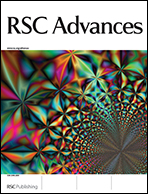Acetylene hydrochlorination over bimetallic Ru-based catalysts†
Abstract
Ruthenium-based catalysts including monometallic Ru, bimetallic Ru–Cu and Ru–Co were prepared using spheric active carbon (SAC) as the support, and their catalytic performance was assessed for the acetylene hydrochlorination reaction, characterized by BET, TG, TEM, TPR and XPS. It is suggested that using cobalt as the additive can significantly enhance the catalytic activity of the Ru/SAC catalyst for the acetylene hydrochlorination reaction. Over the 1%Ru1Co3/SAC catalyst the acetylene conversion is maintained above 95% with 48 h on stream under reaction conditions of 170 °C, C2H2 hourly space velocity = 180 h−1 and the feed HCl/C2H2 volume ratio = 1.1; while the addition of copper results in a lower acetylene conversion. It is illustrated that the cobalt additive can greatly influence the amount of ruthenium species involved in RuO2, Ru0, RuOx and RuCl3 in the catalyst, which results in good catalytic activity and capability to inhibit coking of the 1%Ru1Co3/SAC catalyst. The optimal 1%Ru1Co3/SAC catalyst is a promising non-mercuric catalyst for PVC manufacture, with the advantages of both good stability and low cost.


 Please wait while we load your content...
Please wait while we load your content...